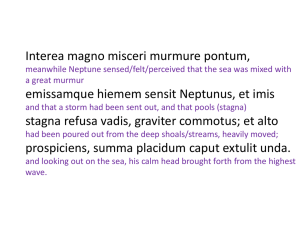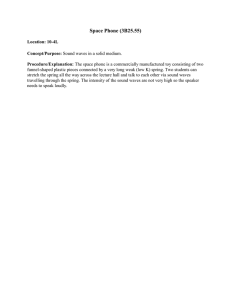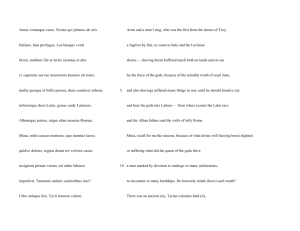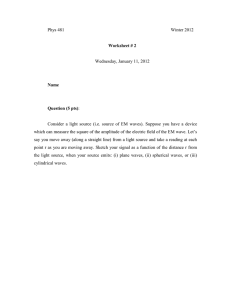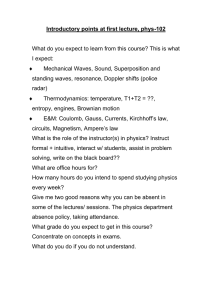Talia flammato secum dea corde volutans
advertisement
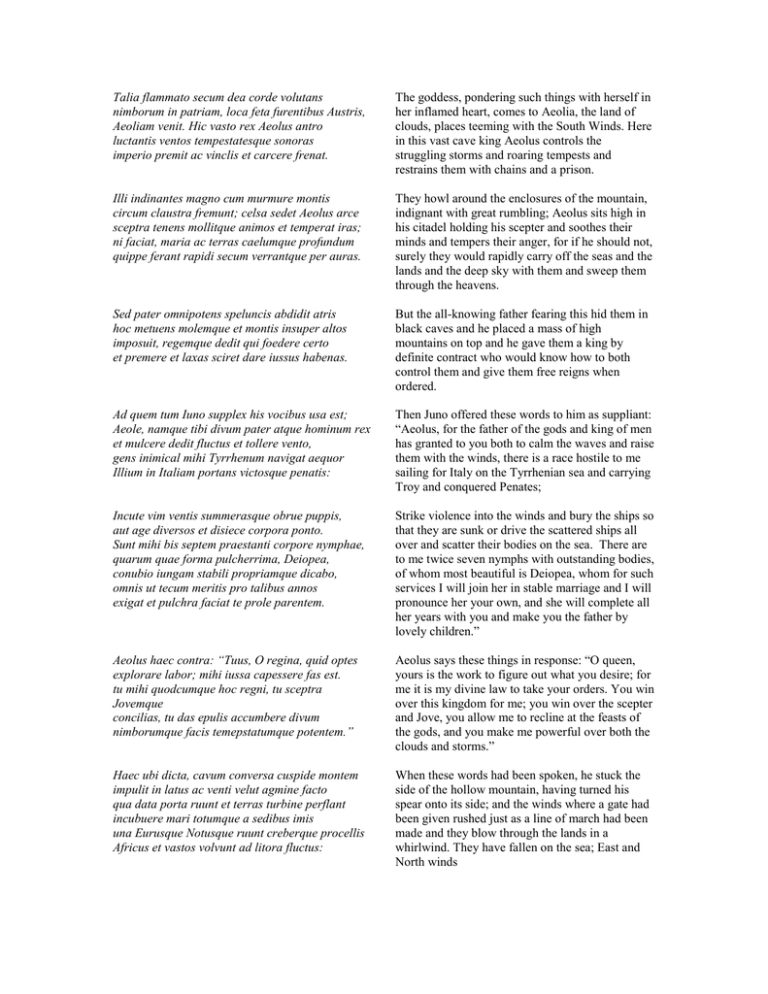
Talia flammato secum dea corde volutans nimborum in patriam, loca feta furentibus Austris, Aeoliam venit. Hic vasto rex Aeolus antro luctantis ventos tempestatesque sonoras imperio premit ac vinclis et carcere frenat. The goddess, pondering such things with herself in her inflamed heart, comes to Aeolia, the land of clouds, places teeming with the South Winds. Here in this vast cave king Aeolus controls the struggling storms and roaring tempests and restrains them with chains and a prison. Illi indinantes magno cum murmure montis circum claustra fremunt; celsa sedet Aeolus arce sceptra tenens mollitque animos et temperat iras; ni faciat, maria ac terras caelumque profundum quippe ferant rapidi secum verrantque per auras. They howl around the enclosures of the mountain, indignant with great rumbling; Aeolus sits high in his citadel holding his scepter and soothes their minds and tempers their anger, for if he should not, surely they would rapidly carry off the seas and the lands and the deep sky with them and sweep them through the heavens. Sed pater omnipotens speluncis abdidit atris hoc metuens molemque et montis insuper altos imposuit, regemque dedit qui foedere certo et premere et laxas sciret dare iussus habenas. But the all-knowing father fearing this hid them in black caves and he placed a mass of high mountains on top and he gave them a king by definite contract who would know how to both control them and give them free reigns when ordered. Ad quem tum Iuno supplex his vocibus usa est; Aeole, namque tibi divum pater atque hominum rex et mulcere dedit fluctus et tollere vento, gens inimical mihi Tyrrhenum navigat aequor Illium in Italiam portans victosque penatis: Then Juno offered these words to him as suppliant: “Aeolus, for the father of the gods and king of men has granted to you both to calm the waves and raise them with the winds, there is a race hostile to me sailing for Italy on the Tyrrhenian sea and carrying Troy and conquered Penates; Incute vim ventis summerasque obrue puppis, aut age diversos et disiece corpora ponto. Sunt mihi bis septem praestanti corpore nymphae, quarum quae forma pulcherrima, Deiopea, conubio iungam stabili propriamque dicabo, omnis ut tecum meritis pro talibus annos exigat et pulchra faciat te prole parentem. Strike violence into the winds and bury the ships so that they are sunk or drive the scattered ships all over and scatter their bodies on the sea. There are to me twice seven nymphs with outstanding bodies, of whom most beautiful is Deiopea, whom for such services I will join her in stable marriage and I will pronounce her your own, and she will complete all her years with you and make you the father by lovely children.” Aeolus haec contra: “Tuus, O regina, quid optes explorare labor; mihi iussa capessere fas est. tu mihi quodcumque hoc regni, tu sceptra Jovemque concilias, tu das epulis accumbere divum nimborumque facis temepstatumque potentem.” Aeolus says these things in response: “O queen, yours is the work to figure out what you desire; for me it is my divine law to take your orders. You win over this kingdom for me; you win over the scepter and Jove, you allow me to recline at the feasts of the gods, and you make me powerful over both the clouds and storms.” Haec ubi dicta, cavum conversa cuspide montem impulit in latus ac venti velut agmine facto qua data porta ruunt et terras turbine perflant incubuere mari totumque a sedibus imis una Eurusque Notusque ruunt creberque procellis Africus et vastos volvunt ad litora fluctus: When these words had been spoken, he stuck the side of the hollow mountain, having turned his spear onto its side; and the winds where a gate had been given rushed just as a line of march had been made and they blow through the lands in a whirlwind. They have fallen on the sea; East and North winds overturn the whole sea from the bottom of its abodes churn up everything and the southwest wind frequent with gusts rolls vast waves toward shore: Insequitur clamorque virum stridorque rudentum. Eripiunt subito nubes caelumque diemque Teucrorum ex oculis; ponto nox incubat atra. Intonuere poli et crebis micat ignibus aether praesentemque viris intentant omnia mortem. Follows both the shouting of men and the creaking of ropes. Suddenly the clouds both snatch away the sky and the day from the Trojans’ eyes; the black night looms over the sea. The skies thundered and the ether flashes with crowded fires and all things promise instant death to the men. Extemple Aeneae solvuntur frigore membra; ingemit et duplicis tendens ad sidera palmas talia voce refert: “O terque quaterque beati, quis ante ora patrum Troiae sub moenibus altis contigit oppetere!... Suddenly, the limbs of Aeneas gone slack with chill, he groans and, stretching both his hands to the heavens, says such things with a cry: “O, three and four times blessed are they who happened to meet their death before the faces of his fathers under the high walls of Troy ...O Danaum fortissime gentis Tydidde! Mene illiacis occumbere campis non potuisee tuaque animam hanc effundere dextra, saevus ubi tot Simois correpta sub undis scuta virum galeasque et fortia corpora volvit!” Oh, son of Tydeus, bravest of the Greek race! That I could not have been able to fall in death on the fields of Troy, and pour out this spirit by your right hand; where Hector lies, by the spear of Achilles, where mighty Sarpedon lies, where Samois rolls so many shields and helmets of men and strong bodies that were snatched away under the waves?” Talia iactanti stridens Aquilone porcella velum adversa ferit, fluctusque ad sidera tollit. Franguntur remi, tum prora avertit et undis dat latus, insequitur cumulo praeruptus aque mons. As he utters these things, a gale roaring with the North Wind strikes the sail opposite him and raises the waves to the stars. The oars are broken,; then the prow turns away and gives its side to the waves, the towering mountain of the water follows in a heap. Hi summo in fluctu pendent; his unda dehiscens terram inter fluctus aperit; furit aestus harenis. Tris Notus abreptas in saxa latentia torquet (saxa vocant Itali mediis quae in fluctibus Aras, dorsum immane mari summon), tris Eurus ab alto in brevia et syrtis urget, miserabile visu, inliditque vadis atque aggere cingit harenae. These men are hanging in the highest wave, the gaping water reveals to them the ground between the waves, the tide rages with sand. Notus the South Wind twists three ships having been caught into the hidden rocks (the Italians call the rocks the Altars, which lie in the middle of the waves, a giant ridge on the surface of the sea). The east wind Eurus drives the three ships from the deep into the shallows and onto sandbars, pitiful to see, and dashes them into the shallows and surrounds them with a wall of sand. Unam, quae Lycios fidumque vehebat Oronten, ipsuis ante oculos ingens a vertice pontus in puppim ferit: excutitur pronusque magister volvitur in caput: ast illam ter fluctus ibidem torquet agens circum et rapidus vorat aequore vertex Apparent rari nantes in gurgite vasto, Arma virum tabulaque et Troia gaza per undas. The huge sea from the top before his very eyes stuck in the rear the one ship which carried the Lycians and faithful Orontes, the pilot is knocked off headfirst and is rolled onto his head,but a wave turns the ship three times in the same place driving it round and round, and a rapid vortex devours it with the sea. Scattered, swimming men appear in the vast maelstrom; men’s arms, planks, Trojan treasure [floating] through the waves. Iam validam Illionei navem, iam fortis Achatae, et qua vectus Abas, et qua grandaevus Aletes, vicit hiems; laxis laterum compagibus omnes accipiunt inimicum imbrem rimisque fatiscunt. Now the storm conquers Ilioneus’ strong ship, now the ship of brave Achates, and old Aletes, now that which Abas carried; All the ships receive the hostile tide by the loosened joints of their sides and gape with cracks. Interea mango misceri murmure pontum emissamque hie sensit Neptunus et imis stagna refusa vadis, graviter commotus; et alto oroscipiens summa placidum caput extulit unda. disiectam Aeneae tota videt auquore classem, fluctibus oppresos Troas caelique ruina. nec latuere doli fratrem Iunonis et irae. Meanwhile Neptune sensed that the sea was stirred with a great murmur and that a storm had been sent out; and the still waters had been poured back from the shoals; he was gravely disturbed; and gazing from the deep he lifted out his calming head from the wave and sees the whole fleet of Aeneas, scattered by the whole sea, and the Trojans oppressed by the waves and the falling of the sky. The tricks nor the anger of Juno lay hidden from her brother. Eurum ad se Zephyrumqu, vocat dehinc talia fatur; “Tantane vos generis tenuit fiducia vestry? Iam caelum terramque meo sine numine, venti, miscere et tantas audetis tollere moles? quos ego! Sed motos praestat componere fluctus. Post mihi non simili poena commissa luetis. maturate fugam regique haec dicite vestro: non illi imperium pelagi saevumque tridentem, sed mihi sorte datum. Tenet ille immania saxa, Vestras, Eure, domos; illa se iactet in aula Aeolus et clauso ventorum carcere regent.” He calls Eurus and Zephyr to him then says such things: “did such a great confidence in your race hold you? Winds, do you dare to stir up the sky and earth without my power and lift up such great hears [of water]? You whom to I-! But it stands before [is more important] to compose the waves having been moved. Afterwards you will atone for your crimes to me with a punishment not similar to this. Hurry up youtr flight and tell these things to your king: the command over the sea and the fierce trident was given not to him but to me by lot. He holds the immense rocks, your home, Eurus; let Aeolus himself throw himself in that court, and let him rule in the closed-off prison of the winds.”
